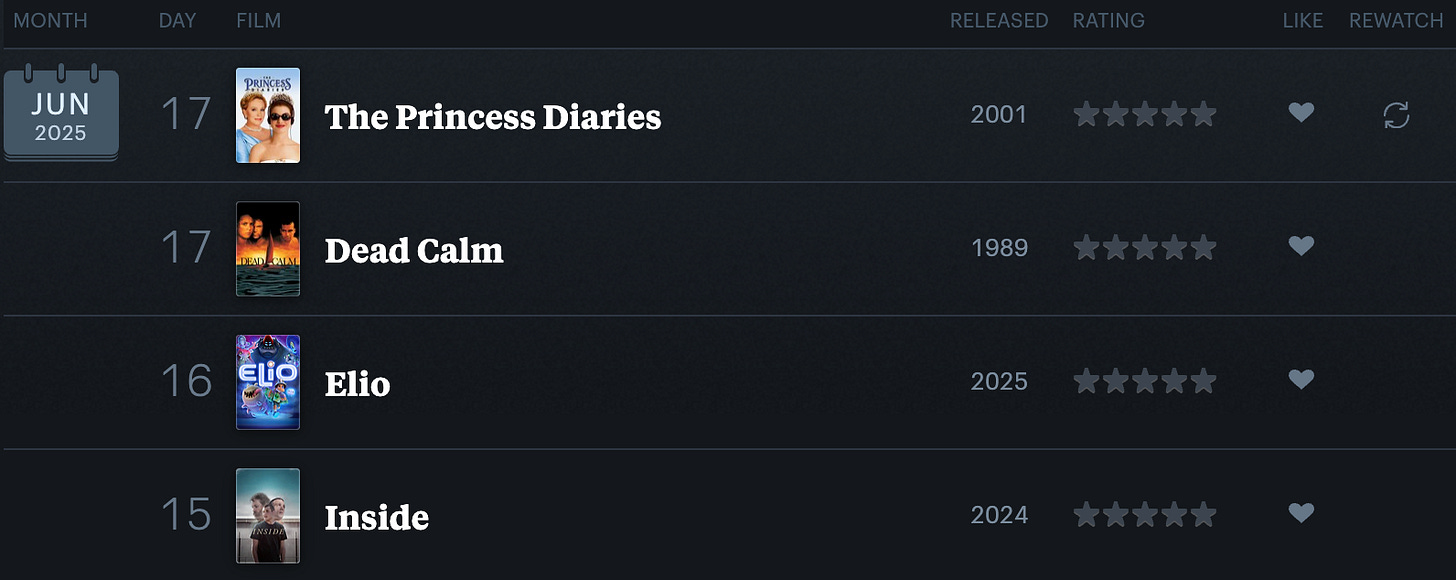Greetings all! Before I jump into today’s newsletter, I wanted to make you aware of a guest recommendation I made over on
’s pertaining to Wes Anderson’s The Phoenician Scheme!But now, for what you’re really here for, check out one of these 10 movies before they leave their current streaming homes!
Awakenings, Netflix
I can’t exactly remember why, but Penny Marshall’s Awakenings was a movie I watched at some point in middle school. I don’t recall all that much about it, in full transparency. But I remember being profoundly moved by the steadfast determination of Robin Williams’ stolid neurologist as he helped catatonic patients find a new lease on life with the application of a novel drug treatment. At the time, it was also somewhat shocking to see the zany Williams acting so subdued, while his main patient, played by Robert De Niro, did more of the wild gesticulating. Nice movie!
Best of Enemies, Max
Morgan Neville and Robert Gordon’s documentary Best of Enemies invites us to survey the roots of the ills we now associate with television news. Conflict as the de facto framing started in the events they document: the 1968 debates between conservative pundit William F. Buckley, Jr. and liberal icon Gore Vidal. These men were not running for president themselves and had only marginal ties to electoral politics. The flailing network ABC just could not keep up with the juggernauts CBS and NBC, so they resorted to using Buckley and Vidal as a sideshow to get some attention. Their snide side chatter, however, quickly became the center of the conversation. We’re living in what feels like a community theater production of the Buckley-Vidal debates at times. Though both men want to win for themselves and for the causes they believe in, the film pays tribute to their demonstrable love of the art of debate and intellectual dialogue rather than simply “owning” the other side to score cheap points.
Dune: Part Two, Netflix
Somehow, I have never recommended Dune: Part Two on this newsletter — likely because it just slipped off my top 10 at the end of 2024. As far as I can tell, this will still be streamable on Max, but the Netflix partnership with Warner Bros. seems to be leading to many expirations across the streamer. So if you want to channel some desert power, cue this one up. And hey, maybe revisit my question about the film that so thoroughly flummoxed Timothée Chalamet, Zendaya, and Austin Butler that the studio struck it from the official FYC site…
Full Metal Jacket, Criterion Channel
“When movies put a focus on one person, it shows who is the most important person in the scene,” I told my 10th-grade English class in the first formal film presentation I ever gave on Full Metal Jacket. (Yes, this is the script from December 2008.) I was breaking down the film’s notorious second scene where R. Lee Ermey marches down the barracks screaming at the newest soldiers, making the class watch it once in full and then repeating it with sound off. By limiting one sense, I learned from a teacher, it heightened another. The conclusion I came to? “By not having Hartman in focus or the soldiers in the front in focus, [Kubrick] is communicating that in war, everyone is equal, no one person is more important than the other, and that focus is not on the individual, but rather the group.” That’s just the tip of the iceberg if you dive into this odd diptych of the Vietnam War experience.
Fury, Amazon Prime Video
I realize that a recommendation of a film “from the director of Suicide Squad and Bright” is a tough one. But as far as studio war flicks go, David Ayer’s Fury is surprisingly solid. (Besides, it contributed the “shoot that guy!” reaction to online discourse.) It begins at the end of the journey in 1945 Germany for a tank division under the leadership of Brad Pitt’s Don “Wardaddy” Collier, an equally red-blooded but less caricatured version of Aldo Raine from Inglourious Basterds. He commands a group of men who have all been visibly demoralized by fighting the inhumanity of the Nazis. The film might think its main attraction is Shia LaBeouf in his method phase as world-weary Boyd “Bible” Swan. But the real star of the show is Logan Lerman’s green, baby-faced Norman Ellison, who gets thrust onto the battlefield following a previous military career as a paper-pusher. Fury forcefully illustrates how war can dishearten men, distort their moralities, yet also forge the ties that bind.
Obsessed, Netflix
I am taking a trip next weekend solely prompted by Beyoncé Knowles-Carter. I think she is probably one of the greatest, if not the greatest, entertainers of our time. But low on her list of talents, to be fully transparent, is screen acting. I love Obsessed as a hot mess of a catfight thriller where she has to defend her husband (Idris Elba) from a temptress (Ali Larter). Maybe I like this movie more as a YouTube clip than a feature, but let me tell you … it HITS (maybe with some smattered laughter) when Bey has to deliver her stern emotional warning: “You touched my child?! You do not touch my child.”
Ocean’s Thirteen, Netflix
We didn’t know how good we had it with the Ocean’s trilogy. Steven Soderbergh is a master of making slick, fun entertainment that gives people what they want while still allowing himself to be playful and fun. I have to imagine the third film swinging back toward another casino heist was a reaction to the perceived disappointment of Twelve. (I’m not at the point of being an apologist for that film, but it’s still good.) That film’s reclamation project has left Ocean’s Thirteen with a less vocal fanbase, so let me just remind you — this is film is better than you remember it being.
Please Give, Amazon Prime Video
This trap of needing to find deep spiritual and psychological satisfaction through work — and wondering if the whole system is just a trap — informs Please Give. Keener’s Kate, a Manhattan furniture vendor who exploits grieving family members of the recently deceased to buy low and sell high, undergoes nothing short of a crisis of conscience during the film. She tries to allay her growing guilt by looking for philanthropic avenues of atonement, most of which are hilariously uninformed, like offering restaurant leftovers to a Black man on the street … who is himself waiting in line to be seated. These self-serving charitable acts culminate in volunteering at a school for children with Down syndrome, but she must quickly excuse herself to go cry in the bathroom. Turns out, she can’t handle being confronted with her privileges so directly. Her revelation is just that, and Holofcener doesn’t see it as something meant to transform — just a sensation that lingers during and beyond the events of Please Give.
(If you want to know more about this film and Nicole Holofcener’s work, check out this subscriber-exclusive essay about the filmmaker I declared the parabalist laureate of white women.)
Radio Days, Amazon Prime Video
Radio Days conjures up the New York City that made Woody Allen in the late ‘30s and early ‘40s, a time from which he already had four decades of distance when making the film. It’s an amount of life elapsed in which memory still sticks but also bleeds into legend and mythology. It makes sense, then, that the film ping-pongs back and forth between the colorful adventures of his family as they congregate in a small apartment and the larger-than-life stories of the era’s entertainers. The democratic nature of radio as a medium of entertainment makes this flow feel natural; these voices beaming into their living room from afar compete for the same airwaves. Sometimes they’re just a low hum in the background, hopeless to break through the family’s shouting. But otherwise, their disembodied intonations rivet the room. No matter what element of the film you find to latch onto, you’ll find a celebration of a past that ties us together even as it begins to fade away.
The Usual Suspects, Max
Christopher McQuarrie, now of Mission: Impossible fame, thanked his dad as he won the Oscar for writing the crime thriller The Usual Suspects. “As the film was going into production, he said, ‘Enjoy this time. This is the moment. The candy store is never so good as when you're looking in.’ Well, Dad, I'm in the candy store. Put 'er there, kid. It's great!” Apart from the sourness of Kevin Spacey, the film is still just a sweet 30 years later — even if you already know who Keyser Soze is.
One of the finest movies of the year, Sarah Friedland’s Familiar Touch, begins its theatrical journey this week at New York’s Film Forum. I reviewed the film earlier this year for Slant Magazine and had the great pleasure of interviewing Friedland and star Kathleen Chalfant last week. This is one of my favorite chats in a while because it so deftly balanced the head and heart powering this special work.
I also reviewed two more “meh” movies opening this Friday: Happyend on last year’s festival circuit for Slant Magazine, and Inside fresh from this year’s Tribeca Festival for The Playlist. Neither egregiously bad nor particularly good.
You can keep track of all the freelance writing I’ve done this year through this list on Letterboxd.
You can always keep up with my film-watching in real-time on the app Letterboxd. I’ve also compiled every movie I’ve ever recommended through this newsletter via a list on the platform as well.
Here’s some fun behind-the-scenes scoop around what happens at test screenings of movies.
I still haven’t seen the new How to Train Your Dragon live-action remake, but I thought David Sims did a great job in The Atlantic (gift article) breaking down these films’ cowardice.
Here’s a good read from Puck (gift article) on why Disney and NBCUniversal are suing Midjourney now for copyright infringement in AI. (Spoiler alert: it’s about outputs from these models, not what’s training them.) And on the note of AI, just trust me that this story won’t disappoint you…
Back to paid subscribers this weekend!
Yours in service and cinema,
Marshall













